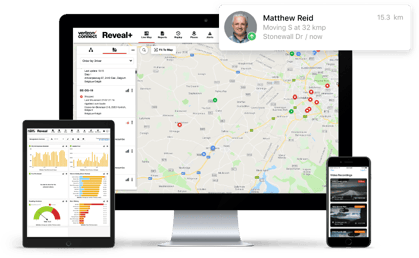9 Secrets to Reducing Fleet Expenses
As a fleet owner, your day-to-day costs can quickly add up. What you don’t know is there are further hidden, expensive...
Read more
At times, ensuring that a business’s fleet operations are running safely and efficiently can be a big challenge. That’s where fleet management can often help, by serving to improve process and productivity whilst also promoting the safety of vehicles and drivers.
Furthermore, fleet management can benefit businesses of any size run a more efficient fleet, increase revenue and improve customer satisfaction.
Before going into depth about the various technologies involved, let’s first start by understanding exactly what fleet management is.
Fleet management is the process of managing and organising commercial vehicles. The most basic function of this is vehicle tracking, which works thanks to telematics. This allows a fleet manager to track the location, behaviour and condition of their vehicles. Fleets can then be organised accordingly to help improve safety and help mitigate risks. In some industries, fleet management also takes the form of asset tracking, for managing equipment such as cranes, bulldozers, trailers and specialist tools.
The overall goal of fleet management is to increase efficiency and productivity, while improving the safety of drivers and vehicles. This can be achieved by using a combination of vehicle tracking, fuel consumption reporting, driver monitoring and vehicle maintenance management.
Fleet tracking software is at the heart of the process. This is based on a GPS system that works through either GPRS, satellite, radio or a combination of all three. Satellite communications tend to be the most expensive data transmission method, but it’s the most effective choice for tracking vehicles in remote locations where the cellular signal is weak. Satellite is also critical for tracking vehicles that travel into terrains in which the geography limits the capabilities of a GPRS signal.
Let’s now take a more detailed look at some of the specific functions of a fleet management system and how it works:
Fleet management technology can benefit businesses and enhance their fleet operations in a number of key areas.
1. Helps promote a safer working environment
Fleet management has the potential to create a safe environment for workers. By monitoring driver behaviour, fleet managers can find areas of concern and implement training and education initiatives accordingly. Meanwhile, monitoring vehicle conditions helps you to maintain the vehicles in the fleet so that they remain safe to use. These positive factors can have the knock-on effect of helping to enhance the day-to-day experience for a workforce, increase their satisfaction, work effort and efficiency.
2. Helps reduce fuel consumption and fleet maintenance costs
Fleet management technology gives managers the chance to spot issues with fleet performance early and identify cost savings. Track mileage and other company vehicle performance indicators on your dashboard, making it easy to identify maintenance and fuel needs. This can help to significantly increase the lifespan of fleet vehicles and decrease downtime.
3. Improves reporting
Analyse your fleet’s performance over time. See important trends for each team, department or across the entire fleet. Our customisable dashboards make it easy to review your progress towards KPIs or budgets, with near real-time fleet analytics provided by our fleet tracking system. Among other factors, these analytics include distance travelled, total idling time, stops duration, vehicle activity (hours worked) and harsh driving.
4. Increases customer satisfaction
Customers can benefit from fleet management solutions too. Bookings and appointment reminders are simplified and notifications are sent to help provide the best possible customer service experience. Customers can track their ordered goods or services and receive more accurate status updates and ETAs.
Hear what our customers have to say today.
Tags: Cost control, Customer service, Data & analytics, Dispatching & scheduling, Payroll, Productivity & efficiency, Safety, Team management




Find out how our platform gives you the visibility you need to get more done.
As a fleet owner, your day-to-day costs can quickly add up. What you don’t know is there are further hidden, expensive...
Read moreVerizon Connect Reveal tracks the fleet data that can have a big impact on your business. These are things like where...
Read moreReveal tracks the fleet data that can have a big impact on your business. These are things like where your vehicles are...
Read moreWork smarter from quote to completion with an end-to-end fleet management solution...
Read more